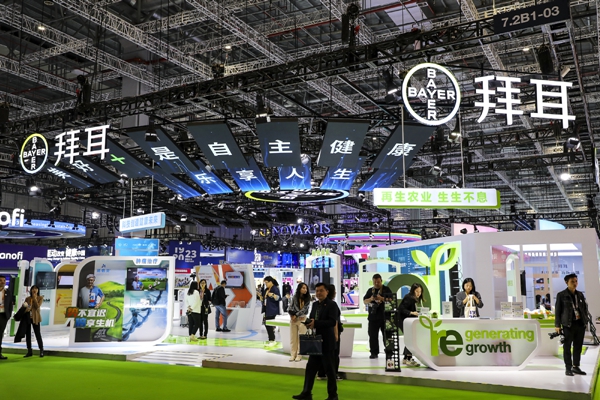Bayer opens life sciences incubator in Shanghai

Upbeat about China's innovative pharmaceutical market, German life sciences company Bayer has said it will keep investing in China and looks forward to more collaborations with local partners.
"China has become an increasingly important source of innovation in global life sciences. It is also home to the world's second-largest pharmaceutical market," said Juergen Eckhardt, head of business development, licensing and open innovation at Bayer's pharmaceuticals division.
"The country's pharmaceutical research and industrial development have entered a new phase of innovation, gaining an increasingly important role in the global pharmaceutical value chain."
"China has a vibrant and vast market, and continues to provide new opportunities for the world through new developments. As China continues to develop, its biomedical industry is undergoing an important phase. Strategic opportunities are attracting more multinational pharmaceutical companies to expand their footprint in China, demonstrating the strong pull of the country's market," Eckhardt added.
On Sept 26, Bayer opened Bayer Co. Lab Shanghai as part in its global network of life science incubators with others situated in the United States, Japan and Germany.
According to the company, the Shanghai unit will provide exclusive space and tailored support services for Chinese startups, promote open innovation and collaboration in the biotech ecosystem and play an important part in Bayer's efforts to promote local research and development and innovation throughout the whole chain.
Specifically, in China, the lab will empower eight to 10 startups, focusing on state-of-the-art innovations, including cell and gene therapies, oncology and new technology platforms.
Speaking of China's pharmaceutical business environment, Eckhardt said that innovation in China has significantly improved with the increasing number of academic translations and its impact on the global bio-industry.
"Multinational corporations have been increasingly active in China's innovation ecosystem since 2019, including reaching cooperation with local startups and establishing innovation centers in China to harness local innovation capabilities.
"China is one of the leaders in cell and gene therapy, with the largest number of clinical trials going on. This is why we launched Bayer Co. Lab in China. We hope to transform more local solutions in China to the world," he said.
Wang Hongwei, a professor at the school of life sciences and vice-president of Tsinghua University, said that in terms of innovative drug development, wider and deeper collaborations are increasingly seen between Chinese startups and biopharmaceutical MNCs. The former group brings out new possible clinical-stage discoveries, while the latter focuses more on offering support in finance, techniques, as well as talent in the subsequent stages.
"This kind of collaboration has already been formed as an innovative ecosystem in China," he said.
This year, Bayer and RTW Investments announced equity investments of $35 million and $127 million, respectively, in CORXEL, a Shanghai-based biopharmaceutical company. The three parties joined forces to advance the development of CORXEL's pipeline in the fields of cardiovascular diseases and ophthalmology.
On Jan 2, Swiss pharmaceutical company Roche reached an agreement with Suzhou, Jiangsu province-based biopharmaceutical company MediLink Therapeutics, focusing on the cooperative R&D of an innovative product targeting solid tumors.
In October, British pharmaceutical giant AstraZeneca reached an agreement on clinical research with Jiangsu province-based biopharmaceutical company Ascentage Pharma. The clinical research focuses on lymphatic diseases.
"We look forward to more local partnerships in China, to quickly identify and drive early-stage innovations, so that more ideas can be put into practice in China," Eckhardt said.
In this year's Government Work Report, China highlighted for the first time the acceleration of innovative drug development, underscoring the significance of this industry.
In July, the State Council issued a plan to support innovative drug development, while Shanghai introduced measures to support full-chain innovation development in the biopharmaceutical industry, both of which provide robust backing for pharmaceutical innovation.

